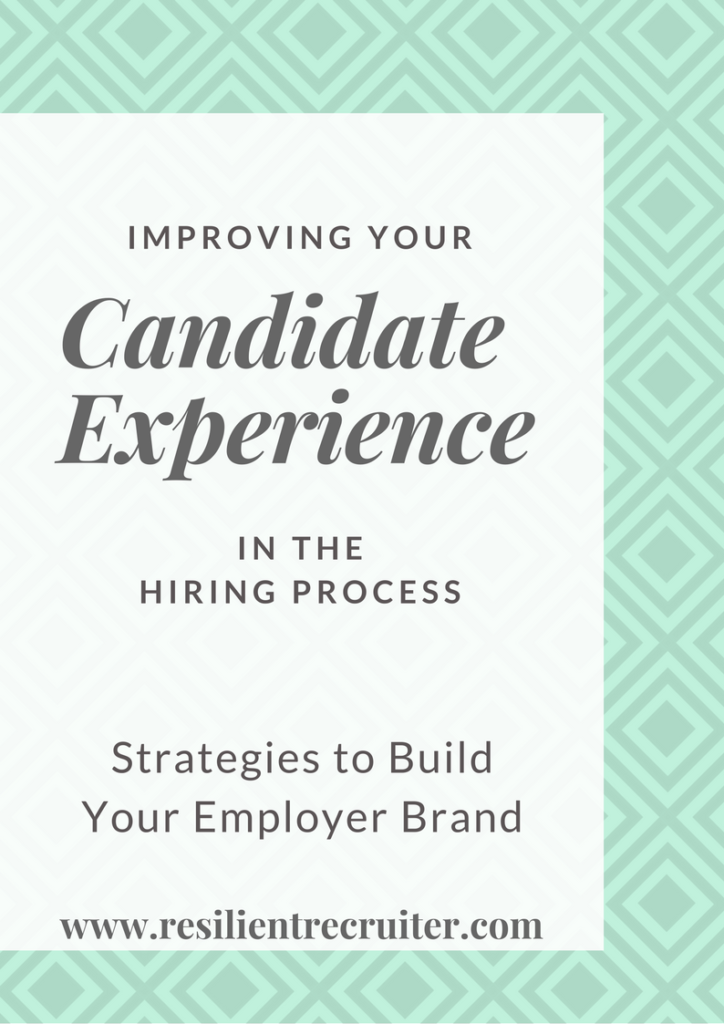In a job market with an unemployment rate under 5%, and new positions being created every day, the candidate market has become slim and very competitive. Candidates, whether they are employed or unemployed, typically have multiple opportunities they are considering at any given time. You may find an ideal person for a role, but lose him or her before you can even extend an offer. A climate like this makes the candidate experience an extremely important part of the hiring process.
What is the “Candidate Experience”?
According to the Social Talent blog, candidate experience is defined as “an integral part of the recruiting process that can impact how effectively a company is able to recruit quality candidates, the popularity of their employer brand, the strength and quality of their referrals, and can even impact the company’s bottom line”.
Considering the fact that there are numerous websites and forums specifically designated to outline candidate and employee experiences, creating a positive work environment is critical. The negative feedback doesn’t go away, and one scathing review could mean the difference between a candidate accepting a position – or even applying in the first place – so it is important to get it right!
Each year, an organization called The Talent Board, conducts a survey of over 220,000 candidates, asking them a variety of questions about their candidate experience. From the most recent survey, 41% of those surveyed described their experience as “poor”, which means that they are less likely to recommend that company to others, or purchase their goods or services in the future, regardless of whether they landed the position or not. A whopping 72% of candidates stated that they told others about their experiences, either positive or negative.
These statistics are important because a candidate’s experience can prove to be a positive marketing tool for an organization. If the experience is negative, it can be a major blow to an employer brand, and may even be a deciding factor in a candidate turning down a position.
What Can an Organization Do to Improve Their Candidate Experience?
What can employers do to improve their hiring process and create a positive experience for all parties involved? In order to make the recruiting process strategic, and a source of positive marketing for the company, consider the following:
Prompt Communication
- Provide quick feedback to applicants who apply to positions online. Over 60% of applicants that apply for positions online state that they never receive a response, or that the response comes over a month later. Even if the response is automated, let the candidate know that their application has been received. Set up the same automated responses for the department responsible for reviewing resumes, so that they are able to review applicants as they apply. 62% of HR representatives admit that many qualified candidates are filtered out by Applicant Tracking Systems.
- Consider this – the average candidate spends over 1 hour researching a company, and a total of 3-4 hours preparing and submitting an online application. According to a blog post by Need a New Gig, employers spend on average, 6 seconds looking at a resume! Even if the candidate is not qualified, provide them the courtesy of a rejection.
- Be sure to make your efforts = the candidate’s efforts throughout the process, and provide consistent, transparent feedback along the way.
Consider the Process Through the Candidate’s Perspective
-
- Make sure that the job description and the requirements are clear and concise, and that other duties, such as travel requirements, are outlined sufficiently. Not including key elements, such as extensive travel or driving requirements, can waste both the company’s and the candidate’s time.
- Go out of your way to make a great first impression. If the first step of the interview process is on the phone, ensure that you aren’t rushing the candidate, and are not in a place where you are distracted.
- Make the candidate experience front and center – walking through it in the job seeker’s shoes. We have all been a job seeker at some point. How would YOU have wanted to process to move along?
- Role play your recruiting process with co-workers to understand how it may be perceived.
- Treat your candidates like you would a paying customer – enough said!
Bring Your Team into the Hiring Process
- As mentioned in my article on Cultural Interviewing, understand who you are as a company, and have team members ask questions focusing on values that are important to both the company and the team the candidate will be working with. Regardless of the skills the candidate possesses, if he or she is not a cultural fit, the chances of the person being a successful hire are slim.
- Seek employee input on the hiring decisions. Allow them to give open and honest feedback on the candidate, and take those opinions into consideration when making a final decision.
Pay Attention to the Details in the Candidate Experience
- Exhibit a positive attitude toward the candidate. Don’t approach feedback as “I’ll get it to you when I have time”. A job seeker is paying more attention to the everyday interactions than you think. Remember – this person likely has two or three other opportunities in consideration, and will keep these details in mind when decision time comes.
- Make the candidate feel special and welcome. If the candidate is flying in, leave a small gift for him or her in the hotel room. Or, have a small welcome basket waiting for them when they arrive for the interview, with a water bottle, snacks, and perhaps some branded item from the company. A small token goes a long way.
- Make exceptions. Most companies have a process, but it doesn’t have to be set in stone. If your company requires two in-person interviews, and the candidate is traveling a long distance, condense it into one. If there is a required presentation, let the person present an edited version at the end of the interview.
- Finally, if the candidate is not being selected for the role, close the loop. Do not leave that person hanging. Be transparent and honest, but treat the person with dignity. Let them use the feedback as a learning experience, but DO give the person feedback.
A candidate that has a positive experience is more likely to hit the ground running when he or she arrives, is more likely to be committed to your company, and is more likely to recommend your company to others and provide continued referrals. Taking the time to create a positive candidate experience will save time and money in the recruiting process and greatly improve your Employer Brand.
 Natalie Lemons is the President of the Resilience Group, LLC, and the author of The Resilient Recruiter and Need a New Gig. Please follow her blog for more articles like this, plus helpful free downloads for Leaders and Job Seekers. Resilient Recruiter is an Amazon Associate.
Natalie Lemons is the President of the Resilience Group, LLC, and the author of The Resilient Recruiter and Need a New Gig. Please follow her blog for more articles like this, plus helpful free downloads for Leaders and Job Seekers. Resilient Recruiter is an Amazon Associate.



Natalie, you hit the nail on the head when you called out Employer Branding. About 6 months ago we noticed a huge up-tick in Employer Branding projects with our clients. Getting and/or retaining talented personnel is essential to them. We have been diligently putting together Employer Branding programs and it is improving the talent pool for our clients. To get to reality you need to get past perception first. And if the perception is that your company doesn’t have career growth, a good culture, etc. than you are dead in the water. Even if it isn’t true! A good Employer Branding program can use elements like culture videos, focused search marketing programs, blogs, social media, etc. to tell your story both outside the company and inside the company. If any of Resilience Group’s clients aren’t doing Employer Branding please give me a shout and let’s talk about it. You think getting and retaining customers is hard? Getting and retaining talented employees so you CAN grow is an even bigger challenge these days.
I couldn’t agree more, Frank! You are absolutely right – perception is reality until you prove it otherwise. All you need is a negative perception, and a talented candidate may not even apply to your company. Your current employees won’t stay either. I have an article in the lineup that mentions that HR and Marketing need to be close companions!